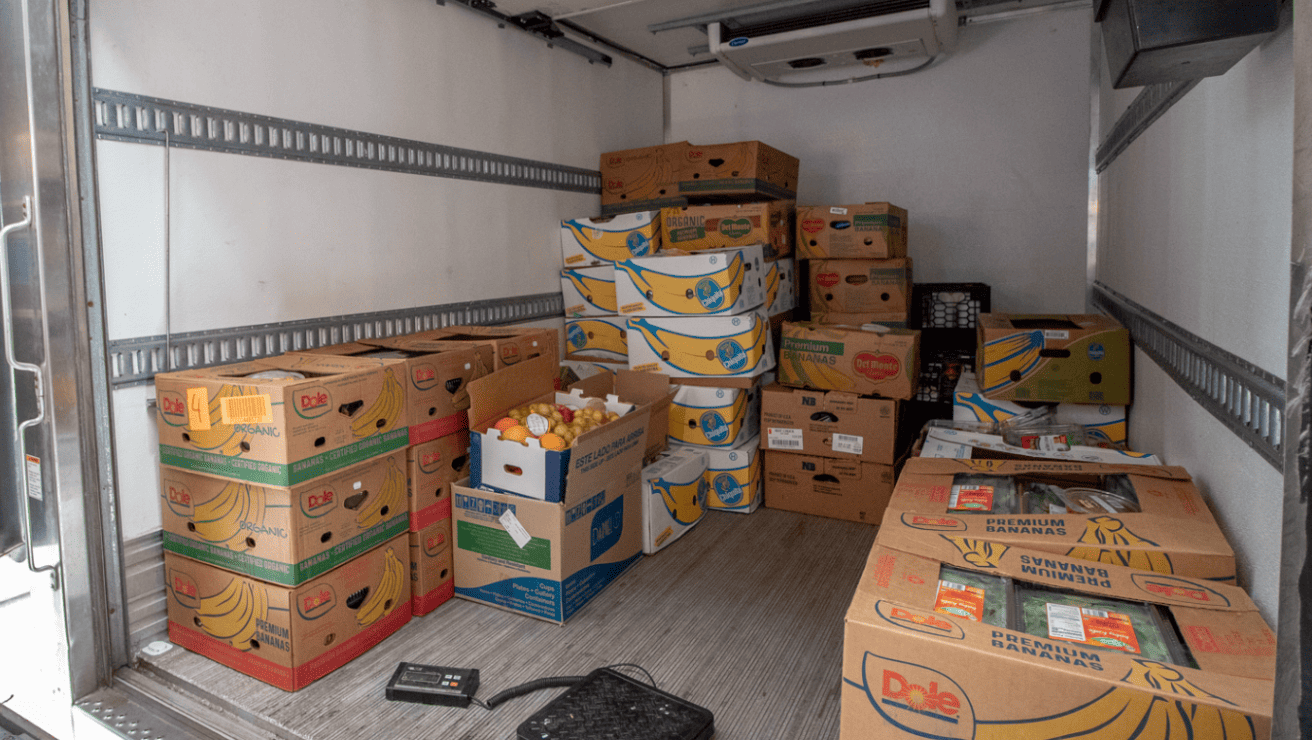A Year of Factory Errors

By Stephen Loverde, Spoonfuls’ Food Rescue Coordinator
It’s amazing how quickly time flies! It’s still shocking to me that I’ve already hit my one-year “workiversary” at Spoonfuls. Very often when talking about my work here, people ask, “What’s the most surprising thing you’ve rescued?” Almost always, I say that I’m stunned by the sheer quantity of food we recover on a daily basis.
Certainly, a full truck is a stark reminder why food is sent our way: nearing or just past sell-by/best-by dates, “imperfections” and blemishes, surplus, etc. But one category of rescued food sometimes overlooked is that which comes our way due to factory mistakes. These are errors made by both humans and machines during the packaging phase of food production, rendering fresh, high-quality products unsaleable.
I love to receive these items from my vendor partners so much that I decided to document with a few pictures! There is almost always a funny, fascinating story behind the mistakes; the staff at stores love to tell me such anecdotes, and I, in turn, enjoy sharing them with nonprofit partners when I’m distributing to them. And now? I am excited to share these stories with you! Here are four of my favorite factory errors (or happy accidents, if you are so inclined) from my first year at Spoonfuls.
An udderly great rescue
This photo shows the roughly 400 pounds of milk we received from one of our vendor partners. According to the store’s Dairy Manager, these gallon jugs were not completely filled before they were sealed and shipped.
Even though they looked perfectly good to the untrained eye, the dairy team knew immediately that the milk couldn’t be sold at the store. As such, hundreds of pounds of milk found their way onto my truck, and ultimately to Spoonfuls’ partners across Needham, Newton, and Boston. I’m amazed that a simple mistake like this impacted hundreds of pounds of milk at just one store. I often wonder how many other hundreds or thousands of pounds of milk were impacted with no food rescue to save them from a landfill.
Nothing fowl here
Picture this: I entered a Trader Joe’s and began collecting the daily donations as usual when a staff member excitedly approached me to discuss a box of chicken. Meat is often a heavily sought-after item by our nonprofit partners and end-recipients, so I’m always happy when stores can provide it. However, I had never seen someone quite so eager to donate a box of chicken. Well, she told me, “These packages were stamped with the wrong sticker. They’re missing our store’s branding.” A branding error meant the chicken couldn’t hit the shelf, but it quickly made its way onto my truck where it was shortly received by a local nonprofit.
One brew-tiful find
I hope you’ve got your food rescue glasses on for this one because this factory error reminds me of a “Can you spot the difference between these two pictures?” exercise. You really do have to pay attention. The exterior labeling on this product indicates that it should be organic breakfast blend coffee. Take a closer look at the pods themselves – they’re not organic. At risk of disappointing a few customers, the store couldn’t put this product on the shelf because of its misleading outer packaging. But thankfully, it didn’t go to waste! These perfectly good coffee pods made a great addition to my beneficiary partners with on-site service kitchens who serve cups of coffee to their clients.
I’m nuts about this one
This is truly my all time favorite factory error from last year. It still makes me smile today! This happy accident is brought to you by Trader Joe’s. The label on this peanut butter was affixed upside down in the factory. Instead of stocking the shelves with these topsy-turvy jars, Trader Joe’s decided to donate them instead, and I ensured that it went to a Spoonfuls’ partner with some peanut butter-loving clients.
Ultimately, what I have learned from my time at Spoonfuls so far, is that factory errors are far more common in the food industry than I ever could have imagined. And while I still chuckle when I see a mixed up label or another wacky error, I do find it frustrating that so many of these items go to waste every day. From human and machine-made mistakes to customers who prefer perfect product, there’s a lot we’re up against. My hope is that we see changes across the food supply chain resulting in less food that needs rescuing. However, until that day comes, I will happily rescue as much of this food as I possibly can.